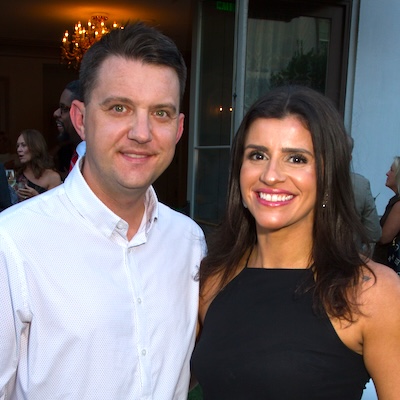## The World of Competitive Cheerleading

**THE COACH**
*Ryan O’Connor*
## Ryan is the Cheer Coach/Coordinator at Ole Miss. She served as the Spirit Coordinator at UAB, and she was a collegiate cheerleader at Alabama.
**You’re at an SEC school. Do these schools recruit cheerleaders, or is it simple tryouts? And roughly how many girls will make the team compared to how many tryout?**I absolutely recruit! I take time to visit local high schools, attend high school nationals and we host recruitment clinics on campus throughout the year. Everyone wants to feel wanted and I love to make that connection with students early in their college search. This year we had close to 200 males and females at our tryouts. We took 26 on the All Girl team and 28 on the Coed team. It’s a tough job to represent your school and we make sure our tryouts reflect that job. **Is cheerleading different in the South or SEC?**YES! Honestly, it is different everywhere. I loved teaching summer camps with UCA because one week I would be in the South, the next week in Scranton, PA and the next in Santa Barbara, CA. There are different words, outfits, styles, etc. in every region. I am partial to the South! **What kind of time is expected from an SEC cheerleader?**Most students realize very quickly that you truly never take your uniform off. Being a cheerleader at a school like Ole Miss means that you are recognized on campus, in the community and most of the time across the country through cheerleading which means you are always “on.” Between games, appearances, workouts and practices, I always tell my students to make time each day for this team. We are sometimes the only team on campus over Winter break and Spring break. It is a tough job, but I wouldn’t trade a single second of my time as an SEC Cheerleader. **How early do you recommend a girl to get started in laying a foundation to be a varsity cheerleader?** Every high school has different requirements for their varsity cheerleading team. I don’t think there is a certain age that girls and guys need to start, but sometimes it is easier to learn tumbling skills when you are younger. Some of them are also former gymnasts! Learning to stretch, tumble correctly, and stunt correctly will help you learn faster and avoid injuries. **What is the most common thing (outside of athletic ability) that you see, that keeps girls from making the team?**Now, it is probably social media. I preach this to my high school and college students all of the time! Like I said earlier, you NEVER take the uniform off. Unfortunately, people love to bring down someone who is in the spotlight. I always say never give them a reason to do this. As soon as I meet someone at a recruitment clinic, the first thing I do is look up their social media accounts. If there is anything questionable, or even if it is blocked or private, that is a big red flag for me.
----

**THE MOM**
*Missi Wimberly*
## Missi is Ivey’s mother. She and her husband live in Vestavia and have five children, including three girls.
**What advice would you give mothers of really young children out there who may be interested in getting their daughters started in cheerleading?**Be sure she has at least a little interest in the sport. It’s easy for us moms to expect and even insist that our kids participate in cheer or other activities because that’s what we did when we were kids. That’s not necessarily a bad thing, but if we’re not sensitive to our child’s individual desires and talents, we could easily push them to resent the very thing we want her to do. One of my girls loved it, one liked it, and one hated it. I was sure to not sign up the one who hated it the following year. The one who liked it is a middle school competition cheerleader now, and the one who loved it is featured in this article! **Certainly making the team is competitive for the cheerleaders. How does this competition transfer to the parents and mothers in particularly?**To the extent that the girls want to make the cheer team, the mothers want them to make it ten times more. Whenever Ivey has tried out for cheerleading, I was more nervous than she was, and the more upset or happy if she did or didn’t make it. The competitiveness between the moms is most obvious right before the tryout process. Some moms are very secretive about how they’re preparing their daughter, while other moms like to make it known what all their daughter is doing to prepare. Some moms seem to enjoy talking about how “ready” their daughter is, which can make other moms worry that their daughter isn’t. Personally, I try to turn a deaf ear to what everyone else is doing. I don’t want to feel like I’m not doing enough for Ivey, or overly confident that she’ll make it. I just try to focus solely on her and teach her to not look at others as her competition, but to see her biggest competitor is herself. **Pop culture is full of cheerleader stereotypes - both good and bad. Are there any negative stereotypes you think are misleading?**When I was younger, cheerleaders were often portrayed as the popular, pretty, somewhat athletic girls who typically dated football players. That’s not necessarily negative, but it’s definitely not how I’d fully describe cheerleaders today. High school cheerleaders now are athletes first and foremost! They’re incredibly strong, hard-working and competitive. They are super-skilled. They condition all summer with grueling workouts, including running in the heat. Cheerleaders also demonstrate remarkable leadership and discipline in and out of the classroom. Popularity and beauty have little to do with how likely it is that they’ll make the team. They have to be a dedicated athlete first. **Incredible stunts are performed by cheerleaders. Does Ivey’s potential for injury ever make you concerned for her safety?**Ivey fractured her L5 in 9th grade and that took her away from cheerleading for a solid year, so I am constantly on the lookout for injury. After she made varsity team at VHHS, she came home many nights complaining of a sore lower back, which would scare me to death. In fact, she would often not tell me when her back was hurting because I would worry so much that she was reinjuring herself. There’s hardly a day that she leaves for practice when I don’t say, “please don’t get hurt.” She laughs, but that’s something I never want her to go though again! **What’s the commitment involved for parents as far as travel and expenses, and just general time?**The commitment required to be a competitive cheerleader is non-negotiable. The same is true for cheer parents. If you can’t give it your all as a parent or as an athlete, then cheerleading isn’t for you. Because cheerleaders have to be skilled in many areas, there is a lot of training required, and it takes place many hours a week and over the course of years. Obviously, in competitive cheerleading, traveling is a big part of it, so there are sacrifices parents must make to take part in that. It can be expensive, and it also costs us time at home and with our other children. But there is so much reward when you see your daughter perform and, in Ivey’s team’s case, place 4th in Nationals! That, combined with the cherished sisterhood that evolves among their teammates makes every sacrifice worth it.
----
**THE CHEERLEADER**
*Ivey Wimberly*
## Ivey is a senior on the Vestavia Varsity squad. She is currently looking at colleges, and hopes to cheer at the collegiate level.
**What is your athletic background? Were there other sports/activities you engaged in in elementary school that has helped you develop into a high school competitive cheerleader?**

All throughout elementary school I went to dance and gymnastics classes, but the biggest factor in preparing me for high school cheer was competing with ACE Allstars. I traveled and competed with the company until I injured my back. The time spent in tumbling classes and team practices at ACE shaped me into a competitor more than anything else. **Where does old-fashioned school spirit and personality fit into modern day competitive cheerleading, where the athletic skills required are so difficult?**While skills are necessary to compete, showing spirit and being visibly passionate are just as important, if not more so. It’s always more impressive and fun to watch stunts and tumbling when the girls performing the skills look confident. At each of the competitions we attended this past season, I noticed teams that performed half-heartedly, and saw how that affected how they scored. The most passionate performers are easily the most captivating, despite the level of their skills. **What is your fitness and diet routine in-season and off-season?**During football and competition season, the squads spend A LOT of time in the cheer room together. Our 8th period class is cheer, so that’s at least an hour every day (with the exception of game days). Tuesdays and Thursdays we practice from about 2:30-5:30, and when competition season is in full swing, we also have Sunday practices for 2 hours. January, the month before nationals, is definitely the most intense. We’re pushed farther, so more reps of everything, and showcase the routine for an audience a few times before we leave for Orlando. It’s more than exhausting, but absolutely necessary!! Preparing for tryouts is different for everyone, and summers include lots of conditioning, practices in preparation for UCA Masters camp, and then a little more conditioning after camp is over. There’s never really a time of the year that we have off! We don’t have a set diet, but are encouraged to stay away from obviously unhealthy foods and to stay hydrated at all times. **What are the expectations for cheerleaders off the stage- at school and in the community? (The way you present yourself, behave, dress, etc.)**Even though it doesn’t always seem like it, there are often eyes on the cheerleaders. When I was in elementary and middle school, I remember watching the high school cheerleaders and wanting to be JUST like them. We are expected to keep a good attitude on and off the mat/track, and behave ourselves in a respectable way. Any questionable acts in or outside of cheer could potentially end up penalizing us, and we understand that everything we do, good or bad, reflects directly on where we come from/our program. **Pop culture is full of cheerleader stereotypes - both good and bad. Are there any negative stereotypes you think are really misleading?**The classic catty cheerleader clique is so far from existent (for my squad that is). Even though there will always be competition within a team, we share such a special bond. In times that it would be easy to be negative and snappy, we continue to lift one another up which I think is very rare. I definitely consider my cheer gals as some of my best friends, and I know all of them are equally as kind to others outside of the cheer room as they are to me. **Do people treat you any differently because you’re a cheerleader? Do you feel cheerleaders are treated with a certain amount of privilege?**For the most part, people don’t realize that we keep working after football is over, so we don’t get too much recognition after late fall. We got to showcase our routine to the student body before we left for nationals though, which helped up our confidence before the biggest competition of the year. Personally, I think being able to represent the school in a positive way is privilege enough. **What’s the relationship between the varsity squad and other cheerleaders (JV and Basketball)?**The varsity squad is expected to be a model to the JV and freshman squad. We’re expected to be on top of things and always be prepared in all aspects. Because varsity doesn’t cheer at any basketball games, we don’t have much of a relationship with the basketball cheerleaders. We share the cheer room and share a love for the Rebels, but that’s just about all we have to do with each other.










